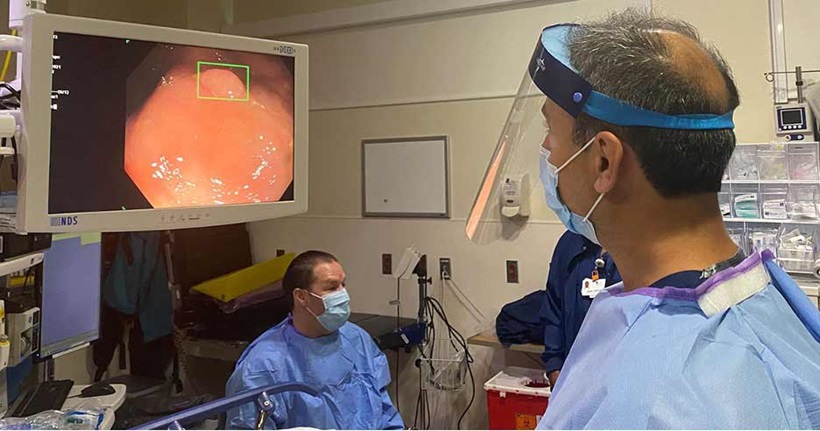
Provider Corner
FEATURING:


GI Genius arms doctors with new tool to help detect colorectal cancer

Dr. Toufic Kachaamy uses GI Genius, a new tool that leverages artificial intelligence to help doctors more clearly and quickly identify polyps, or lesions in the colon.
It’s often a good idea to get a second opinion or have a second set of eyes look something over to get a fresh perspective. Many cancer patients are well served when asking for a second opinion after a diagnosis. In fact, doctors often seek out colleagues for opinions on biopsies, test results or treatment options.
When performing a colonoscopy, Toufic Kachaamy, MD, gets nearly instant input from a new fresh set of eyes that’s’ delivering compelling results.
Dr. Kachaamy, Interventional Program Specialist for Cancer Treatment Centers of America® (CTCA) and a Gastroenterologist at CTCA®Phoenix, uses GI Genius™, a new tool that leverages artificial intelligence (AI) to help doctors more clearly and quickly identify polyps, adenomas and cancerous or pre-cancerous lesions in the colon.
“This is a pioneering addition to our cancer-fighting arsenal,” Dr. Kachaamy says. “With the support of this new system, I am more empowered as a physician to help meet the needs of the patients and communities we serve.”
How does it work?
The GI Genius hardware, which looks similar to a cable television receiver, is compatible with most colonoscopy systems. When connected, the device doesn’t replace the physician conducting the examination, nor does it stage, categorize or provide a diagnostic assessment of a suspicious legion. Instead, it highlights areas of the colon that may look suspicious, including spots a doctor may have missed, prompting them to take a closer look.
A clinical trial that compared colonoscopy results with and without the device found that using GI Genius “significantly increases” the detection rate of adenomas during a colonoscopy.
'Early detection matters'
Since the early 1990s, the numbers of new colorectal cancer cases and deaths have been on a steady decline, thanks in large part to increased awareness and screening. According to the National Cancer Institute:
- The rates of new colorectal cancer cases and deaths in 1992 were about 57 and 27 per 100,000 Americans respectively.
- In 2018, those numbers dropped to about 35 and 13 per 100,000 Americans.
Still, colorectal cancer remains the fourth most-common cancer in the United States, with about 150,000 new cases diagnosed per year. More than 52,000 Americans die from the disease annually.
When caught early, however, the numbers improve dramatically. If colorectal cancer is diagnosed at an early stage, before it’s spread, the five-year survival rate is about 90 percent. If the cancer is diagnosed after it’s metastasized, the survival rate drops to 14 percent.
“Early detection matters,” Dr. Kachaamy says. “My colleagues and I strongly encourage patients to speak with their physicians about screening options and prioritize colonoscopies, particularly if they have risk factors such as family history of colorectal cancer.
Prevention is even better than early detection, Dr. Kachaamy says. A colonoscopy may be able to detect polyps, so the physician can remove them before they develop into tumors.
Other risk factors include:
- Smoking or using tobacco products
- Alcohol abuse
- Poor diet
- Obesity
- Being sedentary
A more disturbing trend is the sharp increase in colorectal cases among younger people. A 2013 study, published in the Journal of the National Cancer Institute, found that new cases of colorectal cancers were rising sharply in young adults, a population not typically screened for the disease.. For that reason, the U.S. Preventive Services Task Force has lowered the recommended age to start colorectal cancer screening from 50 to 45.
You may also decrease your risk of colorectal cancer by adopting a healthy lifestyle, including being physically active, eating a diet low in red meat and processed food and high in fruits and vegetable and not smoking.
Using artificial intelligence for cancer care
GI Genius is the only AI device approved by the U.S. Food and Drug Administration (FDA) for use during a colonoscopy. CTCA Phoenix is the first hospital in the western United States to use GI Genius.
The device is part of a wave of AI-based tools in use or being researched to help diagnose and treat diseases.
The term “artificial intelligence” is somewhat of a misnomer, since the intelligence used to write AI programs comes from real knowledge gathered from years of research, experiences and results. AI programs feed all that knowledge into computers or other devices because they can process the information faster than human beings can.
AI is used in the phones, smart TVs and other devices we use every day. And they “learn” the more we use them. For instance, home assistant devices, such as Amazon’s Alexa or Apple’s Siri, use AI algorithms to respond to commands or serve up information based on previous questions or searches.
Researchers continue to look for new ways to use artificial intelligence to help detect and diagnose cancer. For instance:
Researchers at New York University’s Perlmutter Cancer Center and at Case Western Reserve University in Cleveland have received grants from the National Cancer Institute to develop AI programs that may help predict which lung cancer patients may respond to immunotherapy.
Scientists at the University of Chicago have developed AI tools that may help better detect breast cancer. In a clinical trial, the number of missed cancers dropped by 39 percent when AI was used to analyze breast MRIs.
Doctors at St. John’s College at the University of Cambridge are using AI to better understand how the body’s thousands of proteins interact and how mutated proteins made lead to diseases, such as cancer.
“Artificial intelligence has the potential to transform health care to better assist health care providers and improve patient care,” the FDA’s Courtney H. Lias, Ph.D., said in April when announcing the approval of GI Genius. “When AI is combined with traditional screenings or surveillance methods, it could help find problems early on, when they may be easier to treat.”
Provider Corner

Cleveland Clinic Performs World’s First Implant of Combined Heart Failure Therapies

Heart Transplant Innovation: New ‘heart in a box’ technology provides gift of life to Arizona man, as couple prepares to celebrate 50-year anniversary

The future of Wilms tumor therapies: Q&A with Jeffrey Dome, M.D., Ph.D.
Subscribe to our Newsletter
Our SOlutions
Contact Us
Phone Number: +1 (954) 370-6404
Toll-Free (in the U.S. & Canada):
800-682-6065
Email: info@gmmi.com
2024 © All Rights Reserved.
Code of Conduct | GDPR | PIPEDA | Terms of Use | Privacy Policy | California Privacy Notice | Personal Data Access Form | Responsible Data Leak Disclosure Form



